Redditor Asks If They Were Right Hitting The Brakes To Avoid Hurting A Cat, Almost Causing Car Behind To Slam Into Theirs
We are all animal lovers here, so it's fair to say that any one of us would do anything to avoid harming one of our furry friends. But sometimes, accidents happen, and we're forced to make a split-second decision that can result in an animal (or a human) getting hurt.
Recently, Reddit user u/ihazchanges was put in such a situation. The Redditor posted in the AITA (Am I The A**hole?) subreddit about how he was driving to work on a regular Monday morning when a cat ran out onto the road in front of his car.
The OP's natural reaction was to slam on his brakes to avoid hitting the cat. The Redditor said he had just taken off from a red light, so he was only going around 30 or 40 km/h at most.
That's when the guy driving behind OP got angry and pulled up beside him to flip him the bird. OP then rolled down his window and yelled at the road rager, explaining that there had been a cat on the road that he was trying to avoid.
The Redditor said the man responded by saying he didn't care and that OP could have caused an accident. The Reddit user says it was at that moment he realized that perhaps the other driver was right.
So, OP decided to ask the Reddit community for some clarification. He asked if he was the a**hole for retaliating the way he did and for slamming on his brakes in the first place.
The Redditor explained that he was raised to treat animals like family, and it was just his instinct to avoid hurting the cat. Keep scrolling to find out how people reacted.
The Redditor posted about how he was driving to work on a regular Monday morning when a cat ran out onto the road in front of his car.

That's when the guy driving behind OP got angry and pulled up beside him to flip him the bird.
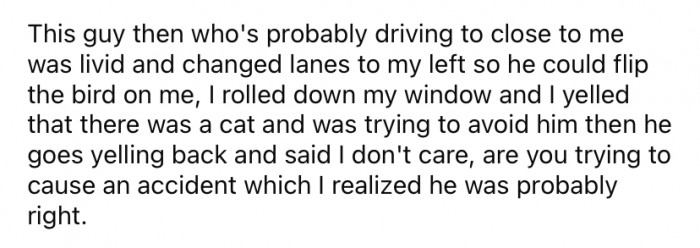
The Reddit user says it was at that moment he realized that perhaps the other driver was right.

In situations like the one faced by the Reddit user, decision-making often becomes a rapid, instinctual process governed by emotional responses rather than rational thought. Research by Dr. Antonio Damasio, a prominent neuroscientist, highlights the role of emotions in decision-making, particularly in high-stress scenarios. According to Damasio's work, emotional responses can sometimes lead to better outcomes than purely logical reasoning, as they allow for quicker assessments of danger and urgency.
His studies suggest that in moments of crisis, such as trying to avoid hitting a cat, our emotional brain can override our rational brain, leading to instinctual choices that prioritize safety. This underscores the importance of recognizing the value of our emotional instincts in such situations, even if they lead to complications for other drivers.
The experience shared by the Redditor also highlights the psychological impact of guilt and responsibility associated with life-and-death decisions. According to research in the field of social psychology, feelings of guilt can arise when individuals believe they could have acted differently, especially in situations involving harm to others. A study by Dr. June Tangney at George Mason University indicates that guilt can motivate individuals to make amends or change their behavior in the future, leading to personal growth.
Understanding the emotional aftermath of such decisions can be crucial for mental well-being. Individuals faced with similar dilemmas should consider developing coping strategies, such as seeking support from peers or professional counseling, to process their feelings and learn from the experience without becoming overwhelmed by guilt.
The Psychology of Split-Second Decisions
Dr. Michael Lee, a behavioral psychologist at Harvard University, discusses how our brains are wired to make rapid decisions in emergencies.
In high-stress situations, such as avoiding an animal on the road, the brain activates survival instincts that prioritize immediate safety over rational thought.
This can lead to impulsive actions that may seem reckless in hindsight but are rooted in our innate desire to protect life.
Here's how people reacted.

"He was the one causing the problem."
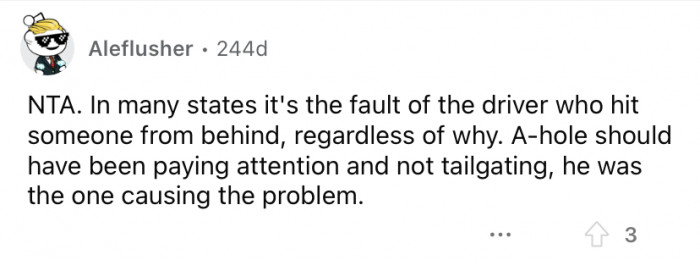
"It probably would have been best to just ignore the person in this situation."
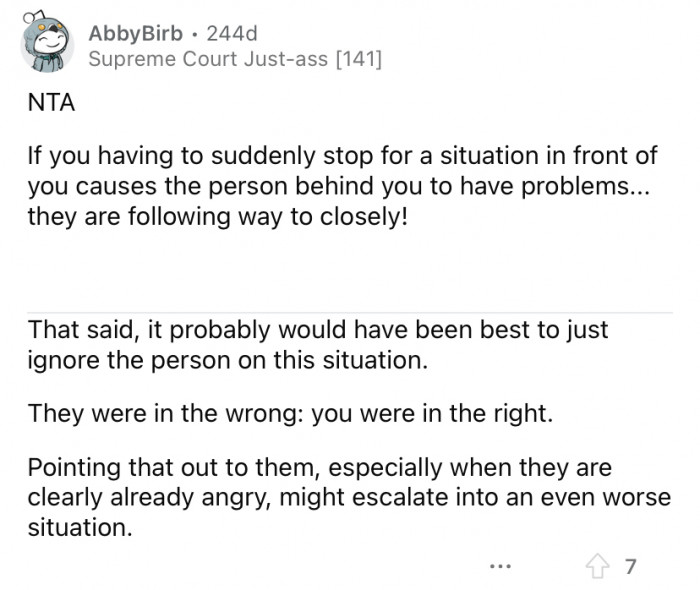
The Ethics of Decision-Making
The ethical dilemma posed by the Redditor's decision touches on the principles of moral psychology, particularly the concept of 'moral intuition' as described by psychologists like Jonathan Haidt. His research suggests that our moral judgments are often based on quick, gut feelings rather than deliberate reasoning. When faced with the choice to hit the brakes to protect an animal, the instinctual response may reflect a deep-rooted moral instinct to protect life, which can sometimes conflict with the practicalities of driving safely.
This illustrates the complexity of ethical decision-making in emergencies, where the balance between moral intuition and practical consequences must be carefully navigated. Understanding this can help individuals prepare for similar situations by honing their moral frameworks and developing skills to manage the emotional weight of such decisions.
Research indicates that the fight-or-flight response is a deeply ingrained survival mechanism that can override logical reasoning during acute stress.
According to studies in the Journal of Experimental Psychology, these instinctive responses are built to react quickly, often leaving little room for deliberation.
Understanding this can help individuals contextualize their reactions and reduce feelings of guilt or regret about their choices.
It's "his legal responsibility."
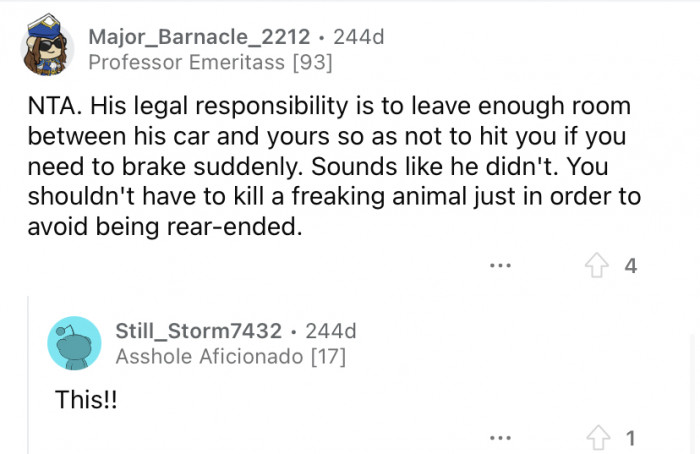
"You are not wrong for saving the cat."

"In terms of safe driving principles, the other guy was right."
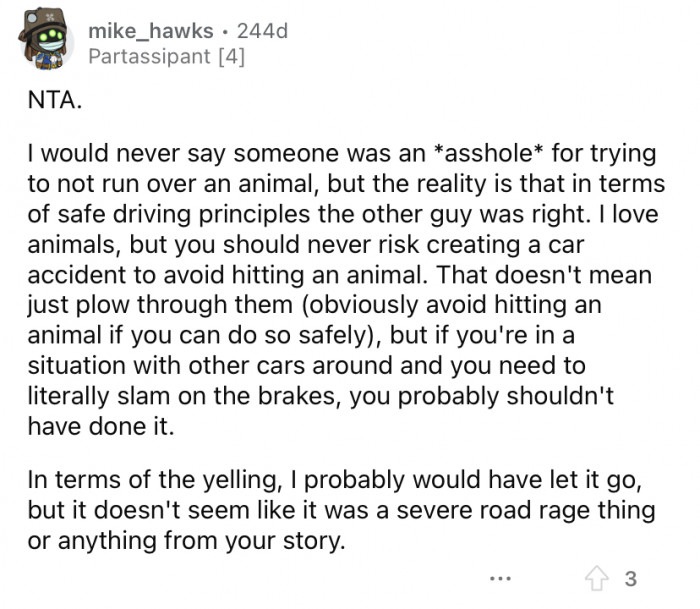
Research into risk perception and behavioral response indicates that individuals often assess risk differently based on emotional context. A study published in the journal Judgment and Decision Making found that people tend to overestimate risks when emotionally charged scenarios are presented, such as potential harm to animals or children. This heightened emotional response can lead to more cautious behaviors, like slamming on the brakes, as the instinct to protect becomes paramount.
Understanding this psychological phenomenon can help drivers cultivate a sense of awareness and preparedness for unexpected situations. Practicing mindfulness and emotional regulation techniques can enhance one's ability to respond effectively without compromising safety, promoting a balanced approach to emergent dilemmas.
Balancing Safety and Responsibility
When faced with a dilemma like this, it’s crucial to consider both safety and responsibility.
Practicing mindfulness can help individuals remain aware of their surroundings, which may allow for more balanced decision-making in high-pressure situations.
Additionally, considering the potential outcomes of various actions can equip individuals to make decisions that account for both immediate safety and the well-being of others.
"Please be careful."
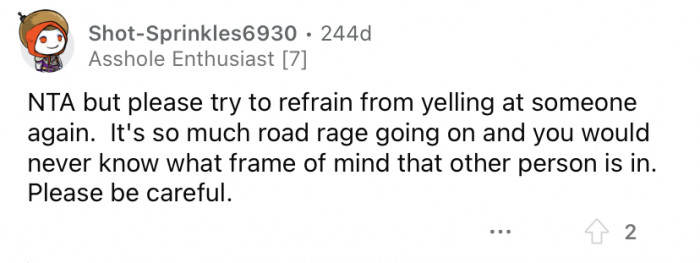
"I wouldn't interact with anyone like this."
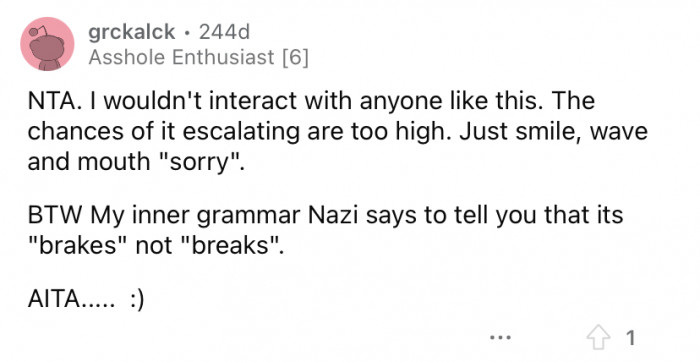
Not the safest thing to do.

Practical Solutions for Drivers
Given the emotional and ethical complexities of driving, it’s important for drivers to develop strategies that promote both safety and compassion. Experts suggest adopting defensive driving techniques, which not only improve safety but also enhance a driver’s ability to anticipate and react to sudden changes. According to the National Highway Traffic Safety Administration, drivers should always maintain a safe following distance and be aware of their surroundings, which can reduce the likelihood of needing to make sudden stops.
Additionally, engaging in regular scenario-based training or simulations can help individuals prepare for situations where they might have to make split-second decisions. This kind of training can improve both reaction times and decision-making under pressure, fostering a balance between emotional impulses and practical considerations.
Engaging in discussions about responsible driving and pet safety can also promote awareness and preparedness for similar situations in the future.
Participating in community forums or workshops can provide valuable insights into safe practices and enhance understanding of animal behavior.
Ultimately, fostering a culture of awareness can help reduce accidents and promote responsible actions on the road.
"Don't respond, or even acknowledge."
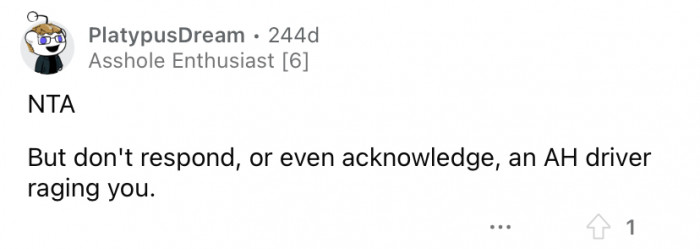
What's your take on this situation? Do you think the OP did the right thing by trying to avoid the cat, or was he wrong for almost causing an accident?
It's hard to judge someone's actions under these kinds of stressful situations. Any one of us might have done the exact same thing under the circumstances.
Of course, it makes sense that the Redditor probably should have been more careful. But none of us would ever want to hurt an animal, so it's only natural that our first instinct would be to slam on the brakes just as the OP did.
Either way, road rage is never okay. And when it happens, it is always best not to retaliate or escalate the situation.
As always, we would love to hear your opinions on this topic. You can share your thoughts with us in the comment section.
Psychological Analysis
This scenario illustrates the human brain's remarkable capacity for quick decision-making under pressure, often driven by instinct rather than conscious thought.
Recognizing this can help alleviate feelings of guilt about one's choices and foster a more compassionate understanding of human behavior in crisis moments.
Analysis generated by AI
Analysis & Alternative Approaches
The psychological underpinnings of split-second decision-making reveal the complexity of human behavior in emergencies.
As noted by Dr. Susan David, an expert in emotional agility, "Our instinctive reactions can often lead us to make decisions that reflect our values and priorities, even in high-pressure situations." Understanding these reactions can foster greater self-compassion and enhance decision-making strategies.
By cultivating awareness and mindfulness, individuals can navigate similar situations with greater confidence and responsibility, as emphasized by Dr. Rick Hanson, a neuropsychologist who states, "Mindfulness allows us to pause and respond thoughtfully rather than react impulsively."
Analysis & Recommendations
In summary, the psychological complexities surrounding split-second decisions in emergencies reveal the interplay between emotion, ethics, and cognition. These insights, grounded in research from various fields, highlight the need for drivers to cultivate emotional awareness and practical skills to navigate the unpredictable nature of road situations. As noted by the American Psychological Association, understanding the psychological factors influencing our behaviors can empower us to make more informed choices, ultimately leading to safer roads for all.
By combining emotional intelligence with practical driving techniques, individuals can better prepare themselves for the complexities of the road, balancing moral instincts with necessary safety precautions.



